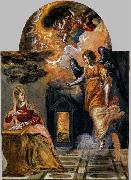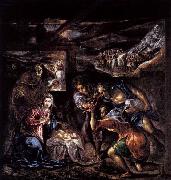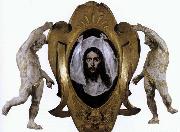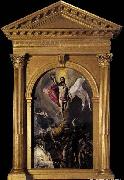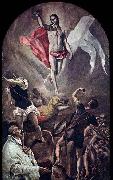GRECO, El Huiler la Reproduction de TableauAll GRECO, El Oil PaintingsGreek-born Spanish Mannerist Painter, 1541-1614 |
|||

|
|||
|
|
|||
|
||||||||||||
| GRECO, El Greek-born Spanish Mannerist Painter, 1541-1614 |
||||||||||||
|
|
||||||||||||
| ID de tableau:: 62348 Annunciation Annunciation 24 x 18 cm Galleria Estense, Modena Probably soon after his arrival in Venice El Greco painted the Modena Triptych. Here he adapts Renaissance principles of representation to a small-scale triptych of a post-Byzantine design common in the Venetian empire. As the wings of the triptych are opened in succession, the sequence of images reveals the state of Man before the Fall to his restoration to a state of Grace through Christ. The scene of The Annunciation is the left panel on the back of the triptych. The Modena Triptych strikingly illustrates El Greco's transition from post-Byzantine icon painter to European artist of the Latin variety. The portable altarpiece, whose unknown patron perhaps stemmed from a Creto-Venetian family, in its open state shows a total of six scenes: on the front, the central panel bears a rare depiction of the Coronation of the Christian Knight, and on the wings we find the Adoration of the Shepherds on the left and the Baptism of Christ on the right. On the reverse, a View of Mount Sinai with its famous convent of St Catherine is flanked by an Annunciation and an Admonition of Adam and Eve by God the Father. This type of object with its gilded frame elements was common in Cretan workshops of the 16th century, as is its use of wood as a painting support. Author: GRECO, El Title: Annunciation , 1551-1600 , Spanish Form: painting , religious 24 x 18 cm Galleria Estense, Modena Probably soon after his arrival in Venice El Greco painted the Modena Triptych. Here he adapts Renaissance principles of representation to a small-scale triptych of a post-Byzantine design common in the Venetian empire. As the wings of the triptych are opened in succession, the sequence of images reveals the state of Man before the Fall to his restoration to a state of Grace through Christ. The scene of The Annunciation is the left panel on the back of the triptych. The Modena Triptych strikingly illustrates El Greco's transition from post-Byzantine icon painter to European artist of the Latin variety. The portable altarpiece, whose unknown patron perhaps stemmed from a Creto-Venetian family, in its open state shows a total of six scenes: on the front, the central panel bears a rare depiction of the Coronation of the Christian Knight, and on the wings we find the Adoration of the Shepherds on the left and the Baptism of Christ on the right. On the reverse, a View of Mount Sinai with its famous convent of St Catherine is flanked by an Annunciation and an Admonition of Adam and Eve by God the Father. This type of object with its gilded frame elements was common in Cretan workshops of the 16th century, as is its use of wood as a painting support. Author: GRECO, El Title: Annunciation , 1551-1600 , Spanish Form: painting , religious |
||||||||||||
|
|
||||||||||||
| ID de tableau:: 62349 The Adoration of the Shepherds The Adoration of the Shepherds 114 x 105 cm Private collection In the eighteenth century this painting was attributed to Giovanni Lanfranco, and later to a member of the Bassano family. Since 1951 the authorship of El Greco is universally accepted. However, this picture owes a great deal to the nocturnal paintings of the Bassano. According to the X-radiograph the upper part of the canvas was completely repainted, and the canvas has been cropped at the top. Author: GRECO, El Title: The Adoration of the Shepherds , 1551-1600 , Spanish Form: painting , religious 114 x 105 cm Private collection In the eighteenth century this painting was attributed to Giovanni Lanfranco, and later to a member of the Bassano family. Since 1951 the authorship of El Greco is universally accepted. However, this picture owes a great deal to the nocturnal paintings of the Bassano. According to the X-radiograph the upper part of the canvas was completely repainted, and the canvas has been cropped at the top. Author: GRECO, El Title: The Adoration of the Shepherds , 1551-1600 , Spanish Form: painting , religious |
||||||||||||
|
|
||||||||||||
| ID de tableau:: 62350 Escutcheon Escutcheon 90 x 130 cm Private collection The sudarium (the cloth with which Veronica wiped Christ's face on the way to Calvary) is shown like a precious object, surrounded by a carved frame that is held by two cherubs or putti. (The cherubs were carved by Juan Bautista Monegro (c. 1545-1621). The ensemble formed part of the elaborate frame of the main altarpiece for the Cistercian convent of Santo Domingo el Antiguo in Toledo. Probably this was the last part of the altarpiece El Greco painted. In the painting, El Greco created a hauntingly disembodied likeness, with Christ staring at the viewer in the fashion of a Byzantine icon. Author: GRECO, El Title: Escutcheon with St Veronica's Veil , 1551-1600 , Spanish Form: painting , religious 90 x 130 cm Private collection The sudarium (the cloth with which Veronica wiped Christ's face on the way to Calvary) is shown like a precious object, surrounded by a carved frame that is held by two cherubs or putti. (The cherubs were carved by Juan Bautista Monegro (c. 1545-1621). The ensemble formed part of the elaborate frame of the main altarpiece for the Cistercian convent of Santo Domingo el Antiguo in Toledo. Probably this was the last part of the altarpiece El Greco painted. In the painting, El Greco created a hauntingly disembodied likeness, with Christ staring at the viewer in the fashion of a Byzantine icon. Author: GRECO, El Title: Escutcheon with St Veronica's Veil , 1551-1600 , Spanish Form: painting , religious |
||||||||||||
|
|
||||||||||||
| ID de tableau:: 62351 The Resurrection The Resurrection 210 x 128 cm Church of Santo Domingo el Antiguo, Toledo Painted for the side altar on the Epistle side (right) of the church, and still in place. Probably painted 1578-79, following the completion of the High Altarpiece. The presence of Saint Ildefonso, the patron Saint of Toledo, was stipulated in the documents. Diego de Castilla, the Dean of Toledo Cathedral, is probably represented in this figure, which certainly is a portrait. The figure assists in setting an ideal plane for the enacting of the mystic event. El Greco has eliminated the intrusion of an incongruous space. The ground running parallel with the plane of the action produces no conflict. The rhythm of the passages of colour and light over the surface helps to hold together the composition, with its dramatic split revealing the figure of the Risen Christ. What suggestions remain of an ordinary conception of space, of corporeality and of a schematic quality of composition, disappear in his final version of the subject (painted in 1596-1600, now in the Prado, Madrid). Author: GRECO, El Title: The Resurrection , 1551-1600 , Spanish Form: painting , religious 210 x 128 cm Church of Santo Domingo el Antiguo, Toledo Painted for the side altar on the Epistle side (right) of the church, and still in place. Probably painted 1578-79, following the completion of the High Altarpiece. The presence of Saint Ildefonso, the patron Saint of Toledo, was stipulated in the documents. Diego de Castilla, the Dean of Toledo Cathedral, is probably represented in this figure, which certainly is a portrait. The figure assists in setting an ideal plane for the enacting of the mystic event. El Greco has eliminated the intrusion of an incongruous space. The ground running parallel with the plane of the action produces no conflict. The rhythm of the passages of colour and light over the surface helps to hold together the composition, with its dramatic split revealing the figure of the Risen Christ. What suggestions remain of an ordinary conception of space, of corporeality and of a schematic quality of composition, disappear in his final version of the subject (painted in 1596-1600, now in the Prado, Madrid). Author: GRECO, El Title: The Resurrection , 1551-1600 , Spanish Form: painting , religious |
||||||||||||
|
|
||||||||||||
| ID de tableau:: 62352 The Resurrection The Resurrection 210 x 128 cm Church of Santo Domingo el Antiguo, Toledo Painted for the side altar on the Epistle side (right) of the church, and still in place. Probably painted 1578-79, following the completion of the High Altarpiece. The presence of Saint Ildefonso, the patron Saint of Toledo, was stipulated in the documents. Diego de Castilla, the Dean of Toledo Cathedral, is probably represented in this figure, which certainly is a portrait. The figure assists in setting an ideal plane for the enacting of the mystic event. El Greco has eliminated the intrusion of an incongruous space. The ground running parallel with the plane of the action produces no conflict. The rhythm of the passages of colour and light over the surface helps to hold together the composition, with its dramatic split revealing the figure of the Risen Christ. What suggestions remain of an ordinary conception of space, of corporeality and of a schematic quality of composition, disappear in his final version of the subject (painted in 1596-1600, now in the Prado, Madrid). Author: GRECO, El Title: The?Resurrection , 1551-1600 , Spanish Form: painting , religious 210 x 128 cm Church of Santo Domingo el Antiguo, Toledo Painted for the side altar on the Epistle side (right) of the church, and still in place. Probably painted 1578-79, following the completion of the High Altarpiece. The presence of Saint Ildefonso, the patron Saint of Toledo, was stipulated in the documents. Diego de Castilla, the Dean of Toledo Cathedral, is probably represented in this figure, which certainly is a portrait. The figure assists in setting an ideal plane for the enacting of the mystic event. El Greco has eliminated the intrusion of an incongruous space. The ground running parallel with the plane of the action produces no conflict. The rhythm of the passages of colour and light over the surface helps to hold together the composition, with its dramatic split revealing the figure of the Risen Christ. What suggestions remain of an ordinary conception of space, of corporeality and of a schematic quality of composition, disappear in his final version of the subject (painted in 1596-1600, now in the Prado, Madrid). Author: GRECO, El Title: The?Resurrection , 1551-1600 , Spanish Form: painting , religious |
||||||||||||
|
|
||||||||||||
| Artiste précédent Artiste prochain | ||||||||||||
|
|
||||||||||||
|
GRECO, El Greek-born Spanish Mannerist Painter, 1541-1614 |
||||||||||||
|
|
||||||||||||
|
CONTACTER DES Etats-Unis |





